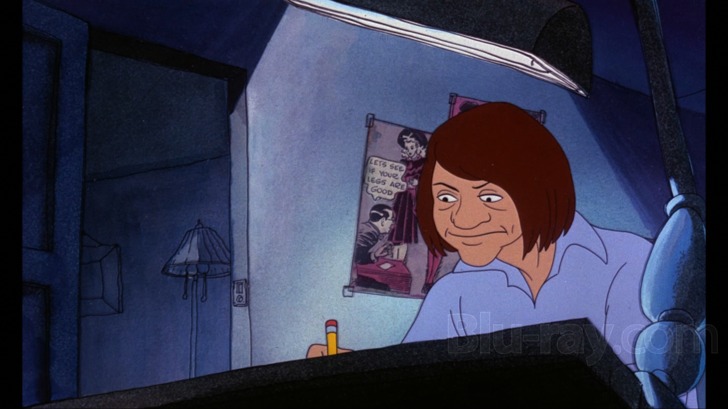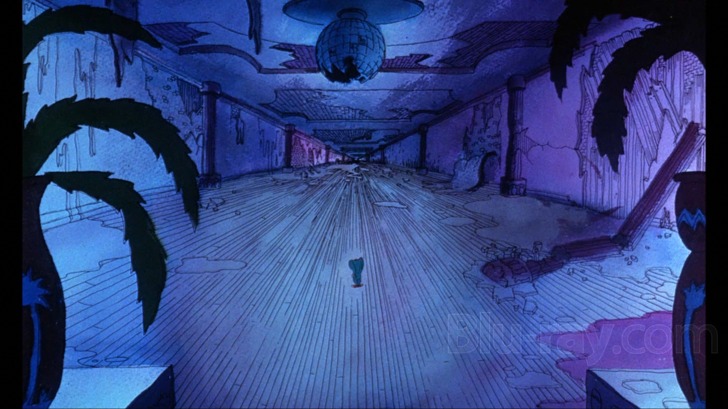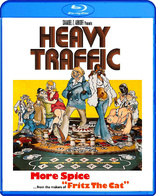Heavy Traffic Blu-ray Movie
HomeHeavy Traffic Blu-ray Movie 
Shout Factory | 1973 | 77 min | Rated R | Jul 16, 2013Movie rating
7 | / 10 |
Blu-ray rating
| Users | 0.0 | |
| Reviewer | 3.5 | |
| Overall | 3.5 |
Overview
Heavy Traffic (1973)
An "underground" cartoonist contends with life in the inner city, where various unsavory characters serve as inspiration for his artwork.
Starring: Lillian Adams, Jamie Farr, Michael Brandon, Joseph Kaufmann, Beverly Hope AtkinsonDirector: Ralph Bakshi
| Animation | 100% |
| Drama | Insignificant |
| Comedy | Insignificant |
Specifications
Video
Video codec: MPEG-4 AVC
Video resolution: 1080p
Aspect ratio: 1.67:1
Original aspect ratio: 1.85:1
Audio
English: DTS-HD Master Audio Mono
Subtitles
None
Discs
25GB Blu-ray Disc
Single disc (1 BD)
Playback
Region free
Review
Rating summary
| Movie | 3.0 | |
| Video | 3.5 | |
| Audio | 3.5 | |
| Extras | 0.0 | |
| Overall | 3.5 |
Heavy Traffic Blu-ray Movie Review
Traffic Jam.
Reviewed by Jeffrey Kauffman June 11, 2013I long wanted to see Heavy Traffic, but probably not for the reason most did. Many potential audience members were probably jazzed to see Ralph Bakshi’s follow up to his sensationally provocative Fritz the Cat, hoping for more X-rated animated erotica, but not only couldn't I have attended an X-rated feature when the film was released, I don’t think I was even aware of the film until years after its theatrical release when a friend told me Heavy Traffic’s soundtrack included the fantastic reworking of “Scarborough Fair” by my favorite band from my childhood and adolescence, Sergio Mendes and Brasil ’66. Now for those of you who are already giggling, let me just say that I was a burgeoning keyboard player and though I was introduced to Sergio and his most popular aggregation sometime after their Top 40 heyday, I was instantly struck by his cool piano voicings and, not so coincidentally, by his phenomenally sexy female singers. A lot of people wrote off Sergio as mere easy listening pabulum back in the day, even as he continued to churn out an astounding string of gold albums and Top 40 hits, but simply listening to his trance like arrangement of “Scarborough Fair” proves how unfair that assessment it. Set to a glistening orchestration by Dave Grusin that predates later similarly exotic work on CTi by a variety of guys like Don Sebesky, Sergio crafts a hypnotic tour de force that inexorably builds to a spacy Fender Rhodes solo and then retreats slightly back to its intentionally chant like foundation. So, years later, let me just send some virtual accolades both to Maestro Mendes, whom I continue to love unabashedly, and to Ralph Bakshi, for having the excellent taste to include this Brasil ’66 classic in his film.

Now the really ironic thing about all of this is whatever you may think of Mendes and this particular “Scarborough Fair” (which recurs throughout Heavy Traffic as a sort of theme), there’s no denying that Mendes’ sound was intrinsically sophisticated (one of my girlfriends back in the day said Brasil ’66 made her think of a party band on a luxury yacht, with people sipping Mai Tais as the craft sailed a clear blue sea). That sophistication seems almost deliberately at odds with Ralph Bakshi’s pretty down and dirty depiction of life in a roiling urban environment.
In fact as I watched Heavy Traffic, I couldn’t help but think of a little remembered Broadway musical called Inner City, which ran for a few months from late 1971 to early spring 1972. The show was best known in its day for having been directed by Tom O’Horgan, who had set Broadway on its ear with his staging of Hair and who had just opened the equally beloved and reviled Great White Way Jesus Christ Superstar just a few weeks prior to Inner City’s opening. The musical was based on Eve Merriam’s book called Inner City Mother Goose, which first appeared in 1969 and was (at least a little incredibly in my opinion) meant for younger readers. Merriam made the probably salient point that Mother Goose rhymes were initially vehicles for social criticism, though that original concept has become dimmed through the mists of time, to the point that many contemporary readers consider the little ditties “nonsense”. Merriam profiled a number of inner city characters via her own versions of Mother Goose rhymes in what was an intentionally ironic juxtaposition of the innocence of the medium with the decidedly rough and tumble world being depicted.
So there’s a perhaps equal though opposite disconnect between the shimmering music of Brasil ’66 and the kind of smarmy world that Bakshi exploits through much of Heavy Traffic. In fact, Bakshi’s examination of the lives of several interconnected characters in a roiling city environment would make the characters in Merriam’s piece look like they came from the real Mother Goose. Bakshi sprang to fame virtually overnight with Fritz the Cat, his reworking of R. Crumb’s famous comic strip (more about Crumb in a moment). Fritz the Cat was quite the scandal in its day, the first animated feature to receive an X rating, a rating which (as unbelievable as it may sound) caused many newspapers around the country to refuse to advertise it (I was a kid in Salt Lake City when the film came out, and my hunch is the uptight Utah newspapers were among those who refused to advertise it, one reason I was unaware it even existed until years later). That of course only made it catnip (sorry) to a certain class of consumer, and Fritz the Cat did (as the trades say) boffo box office.
The overwhelming success of Fritz the Cat no doubt freed Bakshi to indulge both his Id and his Ego in Heavy Traffic, and while the film is an often startling display of technique, blending animation and live action in some inventive ways, it is from a narrative standpoint largely a mess, one that plays like the hallucinations of a drug addled mind (perhaps no mere coincidence, given the film’s era). The film uses a live action framing device of a young man named Michael Corleone (Joseph Kaufmann) playing a pinball game, something that soon morphs into animated adventures that are perhaps taking place in Michael’s mind. As might be expected of a character bearing that name (remember, The Godfather was still a relatively new film when Heavy Traffic came out), the animated Michael’s father is an Italian Mafioso who is unhappily married to a Jewish woman.
In a sort of Chinese nesting doll situation, the animated version of Michael is—an animator, who, to escape the violence of his bickering parents, draws—his parents bickering. This sequence especially bears the imprint of R. Crumb, as Bakshi intentionally mimics the inimitable style of Fritz the Cat’s creator (I have to wonder if Crumb himself helped, but he’s not credited, and there is some reportage that he wasn’t especially thrilled with Bakshi’s film version of his iconic feline, so perhaps it’s only imitation on the part of Bakshi and his team). Michael’s virginity is an embarrassment to his father, though Michael himself seems relatively unconcerned about the issue.
The film cartwheels through a catalog of pretty unseemly characters, as Michael exits the war zone of his home life to a perhaps only slightly less contentious world in the big city. He interacts with, among others, a putative girlfriend, a cross-dresser, several drug users and some low life criminals. Intercut with these animated elements are interstitials of the “real” Michael playing pinball, and even within the animated sequences, many times the backgrounds are live action scenes of a frenzied cityscape. Bakshi is obviously making some kind of point vis a vis the pinball game and what’s happening to the animated Michael, though it’s never really very clear, something that also hobbles the story within a story that makes up the bulk of the film.
Heavy Traffic in fact plays out rather improvisationally, rather like a free jazz (or perhaps more appropriately in this instance acid jazz) experiment that wafts from character to character without apparent rhyme or reason, an animated version of a jam session where the players aren’t riffing on any given chart. The film is also incredibly noisy at times, with an almost Howard Hawksian tendency to have several characters talking at once, to the level that it becomes hard to make out individual voices. This only adds to the kind of equally cacophonous visual qualities of the film, leaving the viewer feeling a certain sense of anxiety which perhaps bubbles up from an almost subliminal level.
The animated sequences are rife with sex (there is lots of female and male nudity in the film) and violence. Bakshi fought with producer and erstwhile partner Steve Krantz during production of Heavy Traffic, and (rather ironically, considering what’s left) evidently some of Bakshi’s most graphic elements were excised from the film (only to appear in later outings). Perhaps the behind the scenes battles (Bakshi was evidently even fired from the project at one point) only added to the film’s kind of chaotic feeling.
The film is perhaps best seen today as a sort of fascinating curio. It’s too intentionally provocative to ever be very funny, and it’s frankly too weird to ever connect from a purely narrative standpoint. We’re left with a gaggle of bizarre characters who are jumbled together in a sort of kaleidoscope of urban dysfunction. This might have delighted an herbally (or chemically) enhanced audience back in the day, but for clearer eyed audiences today, Heavy Traffic is a prime example of an obviously talented artist indulging his every whim, not always to good effect. But when that artist has the good sense to utilize Sergio Mendes and Brasil ’66 as an anchoring element, it’s hard to complain too vociferously.
Heavy Traffic Blu-ray Movie, Video Quality 

Heavy Traffic is presented on Blu-ray courtesy of Shout! Factory with an AVC encoded 1080p transfer in 1.67:1. Due to the film's melding of cel animation and live action, viewers must be prepared for a certain amount of optical degradation, which is most evident in terms of aggregated grit and grime that crops up, usually most visible at the edges of the frame. The live action elements are in decent condition, though they suffer from underwhelming contrast at times, which makes some of the nighttime city backgrounds basically look like black on black, with a few glimmers of light indicating taillights of cars and illuminated windows in skyscrapers. The animated sequences feature rather nice looking elements overall, though occasionally some minor damage creeps in. Colors are very nicely saturated and rather bold most of the time. Line detail remains nicely crisp throughout this high definition presentation.
Heavy Traffic Blu-ray Movie, Audio Quality 

Heavy Traffic features a lossless DTS-HD Master Audio Mono mix that does reasonably well considering the often
crowded soundfield that Bakshi exploits. Ahhh, Sergio Mendes and Brasil '66 in lossless audio—well, not quite.
Audiophiles
may know that A&M, the label that Sergio recorded for during his Brasil '66 heyday (he was so popular many people
assumed the "M" in the label stood for Mendes, though it was actually Jerry Moss), utilized a proprietary phase
cancellation
electronic
processing system known as Haeco-CGS that was supposed to automatically "fold down" stereo recordings for monaural
phonographs (yes, we're talking about ancient technology here). What actually ended up happening,
unfortunately, was
the muffling of the original recording, especially evident in the midrange, which is more than evident in the ubiquitous use
of
Brasil '66's "Scarborough Fair" on this soundtrack. Some of the other source cues, including Dave Brubeck's "Take Five",
sound marginally better. Dialogue comes through well, though, as stated above, the film is very busy a lot of the time,
with
people talking over each other.
A note for the eagle eyed trivia lover: you'll note that the credits posit "Scarborough Fair" being done by Sergio Mendes
and Brasil '77, rather than Brasil '66 (oddly, Heavy Traffic's original soundtrack album correctly credits
Brasil '66). Though "Scarborough Fair" dates from 1968 and was one of Brasil '66's biggest hits, Sergio had rebranded
his group in 1971 after lead singer Lani Hall left to marry A&M founder Herb Alpert. Within a year his remaining Brasil '66
singer, Karen Philipp, also left the group (Karen would briefly appear as Nurse Dish on the first season of
M*A*S*H—she's the gorgeous blonde leaning over the stretcher in the series' opening credits sequence—and
went on to marry Pat Proft, who collaborated with the Abrahams Brothers on a number of their
classic film and television comedies). By 1973, Sergio had not only left A&M, his group really no longer resembled Brasil
'66 in either
personnel or musical content and was churning out more pop oriented fare for the relatively lowly Bell Records.)
Heavy Traffic Blu-ray Movie, Special Features and Extras 

Unfortunately, there are no supplements on this Blu-ray disc. This is one film that really could have benefited from a commentary track.
Heavy Traffic Blu-ray Movie, Overall Score and Recommendation 

Heavy Traffic is a decidedly odd, even bizarre, film, and it will probably appeal most to Bakshi completists as well as those with either a fond memory of or at least an archeological and/or anthropological interest in the late sixties and early seventies. The film is too undisciplined for its own good, but swirling through the quasi-psychedelic wilderness are several fascinating, if sometimes disturbing, vignettes. For better or worse, Heavy Traffic is unforgettable. It may not be everyone's cup of THC, but for those with a certain skewed perspective, Heavy Traffic comes Recommended.
Similar titles
Similar titles you might also like

Greener Grass
2019

Sex Madness
1938

Viva
2007

Poor Pretty Eddie
1975

The Nine Lives of Fritz the Cat
1974

The Landlord
1970

The Amityville Murders
2018

Fleshpot on 42nd Street
Slipcover Edition Limited to 2,500 | SOLD OUT
1973

Smile
1975

Life During Wartime
2009

Champagne and Bullets
Vinegar Syndrome Archive / Sold Out
1993

The Telephone Book
1971

Hell Up in Harlem
1973

Scenes from the Class Struggle in Beverly Hills
1989

Catfight
2016

Crooklyn
1994

In Fabric
2018

Home Before Midnight
1979

The Bitch
1979

Where Is Kyra?
Beat-up Little Seagull / Kyra
2017
